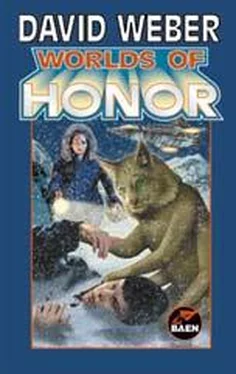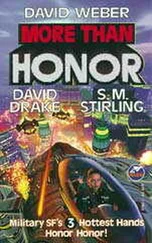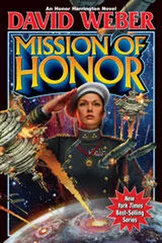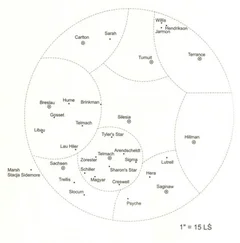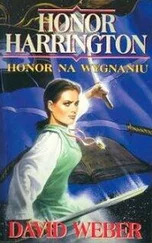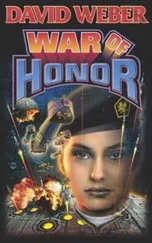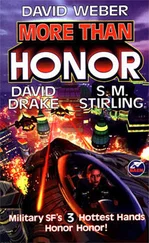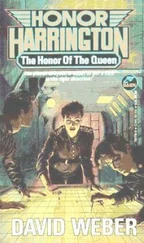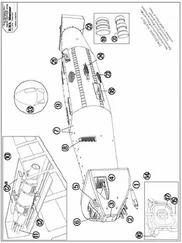David Weber - Worlds of Honor
Здесь есть возможность читать онлайн «David Weber - Worlds of Honor» весь текст электронной книги совершенно бесплатно (целиком полную версию без сокращений). В некоторых случаях можно слушать аудио, скачать через торрент в формате fb2 и присутствует краткое содержание. Город: New York, Год выпуска: 1999, ISBN: 1999, Издательство: Baen Publishing Enterprises, Жанр: Фантастика и фэнтези, на английском языке. Описание произведения, (предисловие) а так же отзывы посетителей доступны на портале библиотеки ЛибКат.
- Название:Worlds of Honor
- Автор:
- Издательство:Baen Publishing Enterprises
- Жанр:
- Год:1999
- Город:New York
- ISBN:0-671-57855-3
- Рейтинг книги:4 / 5. Голосов: 1
-
Избранное:Добавить в избранное
- Отзывы:
-
Ваша оценка:
- 80
- 1
- 2
- 3
- 4
- 5
Worlds of Honor: краткое содержание, описание и аннотация
Предлагаем к чтению аннотацию, описание, краткое содержание или предисловие (зависит от того, что написал сам автор книги «Worlds of Honor»). Если вы не нашли необходимую информацию о книге — напишите в комментариях, мы постараемся отыскать её.
Linda Evans What Price Dreams?
David Weber Queen's Gambit
Jane Lindskold The Hard Way Home
David Weber Deck Load Strike
Roland J. Green
Worlds of Honor — читать онлайн бесплатно полную книгу (весь текст) целиком
Ниже представлен текст книги, разбитый по страницам. Система сохранения места последней прочитанной страницы, позволяет с удобством читать онлайн бесплатно книгу «Worlds of Honor», без необходимости каждый раз заново искать на чём Вы остановились. Поставьте закладку, и сможете в любой момент перейти на страницу, на которой закончили чтение.
Интервал:
Закладка:
The Mesa System had not. For all intents and purposes, Manpower Unlimited owned the star system outright, and if Beowulf's eugenicists were better trained and more skilled, Mesa's had far more . . . scope for their talents, for Mesa rejected the Beowulf Code's ban on casual manipulation of the human genotype. Manpower Unlimited cheerfully produced cloned slave labor, genetically-engineered "indentured servants," and even more deadly versions of the Final War's "super soldiers." Humanity being what it was, there were always buyers (clandestine ones, at least), and since Manpower was already a moral pariah, its directors saw no reason to retain any scruples whatsoever.
None of which would have mattered to the Star Kingdom if not for the fact that the treecats were empaths.
A few of the wilder, more speculative xenobiologists maintained that they were also telepaths, but that was a much more problematical claim, and no one had ever been able to produce any scientific evidence to support it. Their empathy, however, had been demonstrated too conclusively for any reputable scientist to dispute, and that was what made them of interest to Manpower Unlimited. Despite millennia of testing, no one had ever demonstrated anything like reliable, quantifiable, reproducible ESP in humans, or in any of the other handful of sentient species humanity had encountered. Until the treecats.
The mere possibility that the 'cats might be telepaths had sufficed to send Mesan agents creeping into the Star Kingdom to acquire samples. Empathy might have been enough by itself, but the economic implications of discovering how telepathy worked and how to genegineer it into humans were incalculable for something like Manpower Unlimited. Its operators had wanted test subjects and tissue donors, and no one could have had any illusions as to what would have happened to those subjects.
As far as anyone knew, none of the clandestine Mesan efforts had succeeded. Empaths were elusive quarry, and the Forestry Service had made protecting the 'cats against trappers its number one priority from the outset. But the potential prize had been great enough for Manpower to invest what was later determined to have been upwards of eight hundred million Manticoran dollars to create the Richtman Corporation for the purpose of lobbying to legalize the "humane, nonlethal capture" of treecats "for purposes of beneficial scientific examination and export to interstellar zoological institutes."
In addition to whatever had been spent creating the Richtman facade, an unknown (but undoubtedly enormous) investment had also flowed into various political hands through both registered lobbyists and also some very sub rosa channels indeed. It had been a massive effort, and while Manpower had never seen the hoped for return on its money, the Ninth Amendment and its enabling legislation had not emerged unscathed. Efforts to "amend" the legislation so as to emasculate it had failed, but the Richtman legal experts had launched a flank attack by pointing out that the Ninth Amendment was predicated on the definition of treecats as "sapient." Where, they demanded, was the proof of that sapience? After all, how intelligent did a creature which could sense the emotions of any possible testers have to be to counterfeit sapience?
The best testing techniques available had been brought to bear, by treecat partisans and their opponents alike, and the most anyone could honestly say was that results were inconclusive. Rather wildly so, in fact. Some tests insisted the 'cats were as intelligent as humans themselves; others insisted they were actually somewhat less intelligent than Old Earth's pre-genegineered dolphins had been. Oddly enough, they appeared to test better at problem-solving when no human testers were present, which seemed to stand the "empaths counterfeiting sentience" argument on its head. It was almost as if the 'cats had decided not to cooperate in certain instances, or even to deliberately prejudice the results, which was ridiculous, of course. But ridiculous or not, the salient point was that everyone was forced to agree the tests were inconsistent, and the anti-amendment forces insisted that inconsistent was simply another way of saying "valueless."
The 'cats' relatively small size was also pounced upon by Richtman's lawyers, who pointed out that no other known sentient species had such a low body mass, and no one could deny that 'cat brains were much smaller than human ones. Their supporters might argue that the enlarged nodes of nervous tissue found at each pelvis functioned as secondary brains of some sort, but that, too, had never been scientifically demonstrated.
Xenobiologists from all over explored space had been attracted to the Star Kingdom as the dispute heated up. The 'cats were only the twelfth nonhuman sentient species ever discovered (assuming they were sentient), and that was enough to bring scores of scientists flocking in to examine them. Unfortunately, the 'cats didn't appear to want to be examined, and "wild" 'cats tended to disappear whenever a new team of scientists set up shop in their neck of the picket woods. 'Cats who had adopted humans were more readily available . . . but they were also more readily protected . Besides, those who doubted their intelligence argued that 'cats who had adopted weren't suitable test subjects. After all, if they were telepaths as well as empaths, how could anyone know he was actually testing the 'cat and not simply the efficiency of its link to its human partner?
A certain percentage of out-system scientists had grown steadily more angry at the dearth of test subjects. They seemed to feel the Forestry Service ought to have netted "wild" 'cats and dragged them in for study purposes, if that was the only way to get them. The SFS certainly shouldn't have been protecting the elusive little creatures! It was probable that most of the scientists of that opinion had been completely legitimate, but at least some had been imported by Mesan interests to help muddy the water . . . and all of them had been doomed to disappointment when it came to changing the SFS's mind.
The result had been a blistering debate about what the treecats truly were, and the Gryphon planetary government (after some extraordinary infusions of secret "campaign contributions") had actually passed a planetary referendum calling upon the Crown to revoke their sapient status. The Constitution provided for referenda from the planetary parliaments as a grass-roots avenue for offering amendments, and the Gryphon act had been intended as the opening shot in such an effort. It had failed, but not without lending the debate a life of its own, exclusive of Richtman's efforts. For one thing, unscrupulous speculators had scented additional, potentially enormous profits. If the Ninth Amendment could be repealed and the 'cats stripped of their status as sentients, their claim to any of Sphinx's surface would also be overturned. Precisely what would happen to all that land—whether it would revert to the status of Crown land or be up for grabs by anyone with ready cash—was unclear, but if those same anyones with the ready cash could just take a hand in drafting the language that repealed the amendment. . . .
The battle had dragged out for years. Every vote indicated that a clear majority of Sphinxians were staunchly opposed to repeal, supported by a much thinner majority of those living on Manticore. Gryphon had consistently voted for repeal, but Gryphon was a special case where vote "managing" was a thriving industry run by the relatively small handful of powerful nobles who had secured a stranglehold upon its local economy. (Which, in no small part, helped explain why Queen Consort Solange, like most of Gryphon's yeomen freeholders, had seen the Crown and its central authority as their only real ally against the local aristocracy's depredations.)
Читать дальшеИнтервал:
Закладка:
Похожие книги на «Worlds of Honor»
Представляем Вашему вниманию похожие книги на «Worlds of Honor» списком для выбора. Мы отобрали схожую по названию и смыслу литературу в надежде предоставить читателям больше вариантов отыскать новые, интересные, ещё непрочитанные произведения.
Обсуждение, отзывы о книге «Worlds of Honor» и просто собственные мнения читателей. Оставьте ваши комментарии, напишите, что Вы думаете о произведении, его смысле или главных героях. Укажите что конкретно понравилось, а что нет, и почему Вы так считаете.
